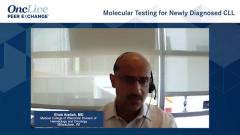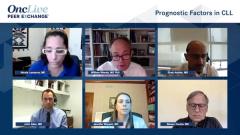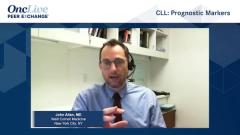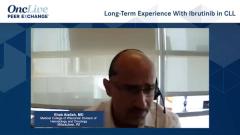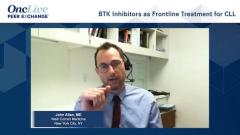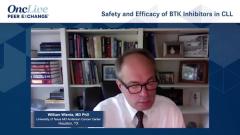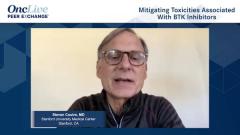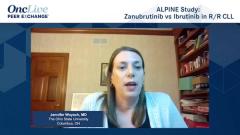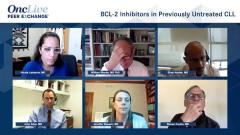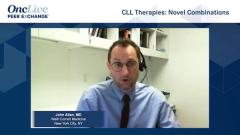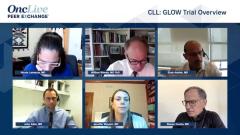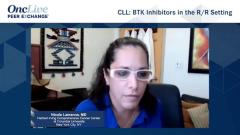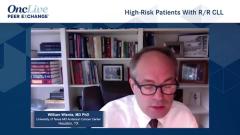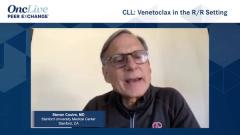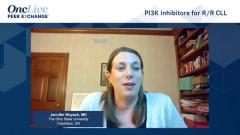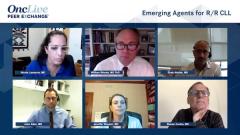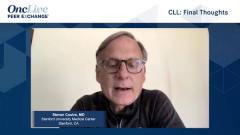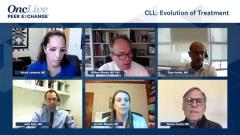
BTK Inhibitors as Frontline Treatment for CLL
Leukemia experts provide their personal experience using Bruton tyrosine kinase (BTK) inhibitors to treat patients with chronic lymphocytic leukemia (CLL) in the first-line setting.
Episodes in this series

William Wierda, MD PhD: You mentioned rituximab and ibrutinib. John, maybe you can comment, and then we’ll move on to adverse effects and toxicities with the BTK [Bruton tyrosine kinase] inhibitors. Perhaps Jennifer can also add her perspective. There was a randomized trial that looked at ibrutinib monotherapy vs combined with rituximab. We also did a randomized trial at [The University of Texas MD] Anderson [Cancer Center]. Jan Burger was the PI [principal investigator] of ibrutinib plus or minus rituximab. We see different outcomes potentially with the acalabrutinib experience and obinutuzumab. Can you give your comments on rituximab, rituximab with a BTK inhibitor, and obinutuzumab? What are your thoughts on why there might be a difference in the ELEVATE TN outcomes we’re seeing?
John Allan, MD: I was going to punt this question back to you and Jen because the data are coming out of groups you’ve led and have been working with. But I can give my viewpoint of how this information is funneled down to people outside you. With rituximab, most people feel pretty comfortable that the body of literature out there is not really showing a benefit. It doesn’t seem to deepen those CRs [complete remissions], and it does not really seem to change MRD [minimal residual disease]–negativity rates. Now 1 very large phase 3 study and the MD Anderson larger phase 2 experience are showing no real added benefit in terms of that long-term outcome in PFS [progression-free survival] with rituximab added to ibrutinib. It’s an anti-CD20, it’s an infusion; there’s B-cell depletion. There are some issues with it. If you’re not going to get the bang for your buck, which in the CLL [chronic lymphocytic leukemia] world is prolonged PFS, there’s not much reason to expose patients.
There are 2 other studies showing next-generation anti-CD20 antibodies that you’ve alluded to having some modest progression-free survival benefit by having earlier exposure. These second generations are typically glycoengineered. They have enhanced ADCC [antibody-dependent cell-mediated cytotoxicity] and complement activated cellular cytotoxicity. They have been engineered to have some more activity in terms of cell kill. ELEVATE TN has shown about an 87% PFS difference. The caveat being that it wasn’t a prospectively designed end point, and it’s a post hoc review of that, showing technically a descriptive statistic showing the difference between these 2 groups; it’s unclear to me why that is. I have some questions. I don’t know if I’ve had that answered.
When you look at the forest plot, patients with IGHV mutations have the most impact. And then when you look at the groups, there’s a slight imbalance—about a 9% difference—of these patients, with IGHV mutations being in that AO [acalabrutinib, obinutuzumab] group. Whether that has an impact, I don’t know, but it makes you wonder if that’s adding a little to it. Ultimately, you have to treat 100 patients to find those 6 or 7 who might have that improved progression-free survival with an anti-CD20. I look at this as not necessarily a huge game-changing thing, because overall survival benefit has not been shown to be added there. You have all the potential toxicities and issues of anti-CD20, coming in a further 6 months, the B-cell depletion, the hepatitis reactivation issues, and the PML [promyelocytic leukemia] issues. All these things have been noted with that. We don’t perfectly know whom to isolate and offer that therapy to. Those are the issues with it.
I also go back many times, and maybe people have heard me say this, bendamustine and obinutuzumab and indolent lymphomas are proven to have an improved progression-free survival over rituximab-based therapies. But in general practice, there’s not a lot of use of that because of the cytopenias. In my own practice, I don’t use a lot of BG [bendamustine, obinutuzumab] for follicular lymphoma or other things. You see this modest benefit, and you try to weigh whether to incorporate it. It’s not a 1 size fits all. I don’t know quite how to incorporate it. I find it intriguing and interesting. We don’t want to leave efficacy on the table by any means. But it’s not prospectively statistically proven in this manner that we’d all love to really have.
Nicole, I can let you speak to it as well, but the other study I alluded to was the ibrutinib-obinutuzumab vs ibrutinib study, which also showed a modest PFS benefit. It was a much smaller study, but with further evidence for these anti-CD20s that are second generations having potentially more activity, more MRD negativity, and potentially affecting long term with a relatively short exposure of the 6 months or whatever it might be. The 2 studies were a little different. That’s my viewpoint. I took a little too much time. Thank you.
Nicole Lamanna, MD: I agree with John. The issue is when we talk about if we’re going to be giving somebody continuous therapy anyway. Are we going to add the anti-CD20? Many of us look at this as we’re going to give either fixed duration or continuous therapy. Are we really going to add in the CD20? Most of us probably do not. There are some rare exceptions. I might add it in for some patients if I had to get somebody’s blood counts in or they have some autoimmune issues, where they might benefit from adding the anti-CD20. But in general, I’m going to give BTK as monotherapy, given those fantastic results Jennifer just talked about. I’m probably going to just give it as monotherapy and not add the anti-CD20 unless there’s a compelling huge difference, that long term we’re going to see.
I’d argue that given the earlier data with rituximab and obinutuzumab with the old cooperative group study that Steve and Bill might remember, the more rituximab you added to fludarabine, the higher the responses went as well. One could argue if you gave more rituximab, maybe there would be a difference, because obinutuzumab is certainly more potent. But if you add in more rituximab, those responses might go up as well. That’s not what I think in practice. What John was alluding to is we’re probably not going to do that in practice if we’re going to do a BTK monotherapy.
TRANSCRIPT EDITED FOR CLARITY


